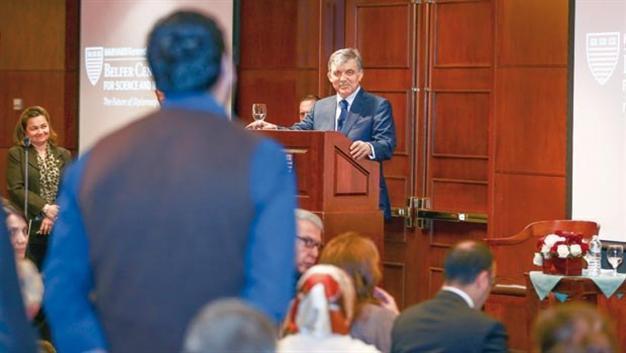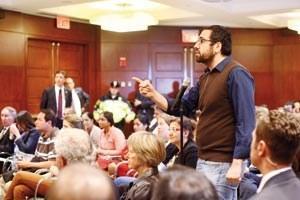Turkish professor at Harvard asks hard questions to President Gül on Gezi Park
Razi Canikligil – CAMBRIDGE, Mass. / Hürriyet
 Turkish President Abdullah Gül faced a pointed question May 30 at Harvard University about police violence in Turkey on the anniversary of the Gezi Park protests.
Turkish President Abdullah Gül faced a pointed question May 30 at Harvard University about police violence in Turkey on the anniversary of the Gezi Park protests.“How do you sleep at night when people are dying in Turkey? Aren't you ashamed to be at the head of such a state?” Dr. Emrah Altındiş, a medical specialist at the prestigious American university, asked the president during a panel at the school.
“Now you listen to me: No one would let you ask such kind of questions that easily,” Gül said in response.
Altındiş asked his question during a Q&A session at the event, which drew about 150 people. “It's the anniversary of the Gezi events. Last year, I and several Nobel-laureate colleagues published an article in the journal Science. We noted and protested the fact that the state of the Republic of Turkey, which you head, killed eight citizens, delivered head trauma to 90 of our people, was responsible for the loss of nine people's eyes, and left thousands of people choking on gas,” the doctor said.
“But the violence in Turkey is continuing. Three women are killed every day, and four workers are murdered in workplace accidents [each day]. The army which you head killed 34 people in Roboski [in December 2011]. Are you not ashamed to head such a state?” Altındiş continued.

“Don't you see that your hands are dripping with blood? How can you tell lies to us here about democracy? How do you sleep at night? Your prime minister calls 14-year-old boys terrorists,” he said in reference to Berkin Elvan, one of those killed during Gezi by police.
The doctor also pointedly noted that he would have received a beating had he had the temerity to pose such a question in Turkey.
“These sorts of events happen in other countries too. The protests in Gezi Park began with cool-headed actions, but illegal organizations joined the fray when the initial incidents were not properly dealt with. This was of course very upsetting,” Gül said, adding that not all the information Altındiş mentioned was correct.
















